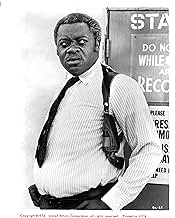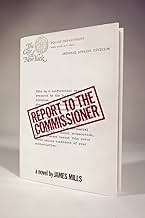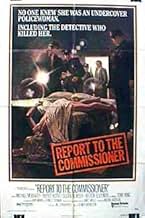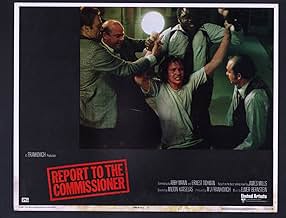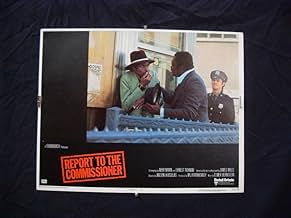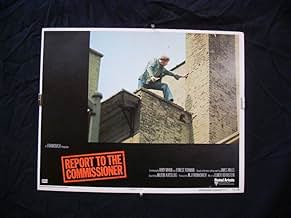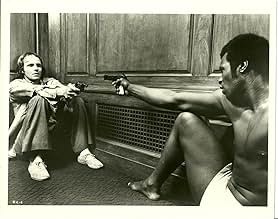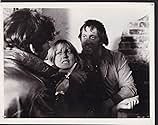IMDb-BEWERTUNG
6,7/10
1357
IHRE BEWERTUNG
Füge eine Handlung in deiner Sprache hinzuPolitics skew the probe of a rookie detective's accidental shooting of an undercover policewoman.Politics skew the probe of a rookie detective's accidental shooting of an undercover policewoman.Politics skew the probe of a rookie detective's accidental shooting of an undercover policewoman.
- Regie
- Drehbuch
- Hauptbesetzung
- Auszeichnungen
- 2 Nominierungen insgesamt
Bob Balaban
- Joey Egan
- (as Robert Balaban)
Bebe Drake
- Dorothy
- (as Bebe Drake Hooks)
Empfohlene Bewertungen
10jdamico5
I just got back from a film club screening of Report to the Commissioner, followed by a Q & A with Jonathan Demme...I loved it!
I thought that Michael Moriarity's performance was amazing; he was able to capture the ambivalence of wanting to do "the right thing", according to his value system, and carrying out the legacy that his father had wanted for his older brother, who'd been killed in Vietnam.
His internal torture was brilliantly played in the elevator scene, in which he was wordless, but communicated his conflict and terror chillingly nonetheless.
The most touching scene for me was when he was giving his statement to the police officials. When he was questioned about his "subversive" college activities he poignantly stated that he had protested the (Vietnam) war. It was resonant for me, having been one of those protesters, and relevant to these times--- our war in Iraq, and the current political environment which implies that anyone protesting it is "un-American".
Looking at the demographics on this site in terms of voting on this film, I find it very interesting that my age cohort gave this film the highest ratings. Perhaps it's because we lived through times that make this film cinema verite'. I'd love to hear other's opinions on this interesting phenomenon.
I thought that Michael Moriarity's performance was amazing; he was able to capture the ambivalence of wanting to do "the right thing", according to his value system, and carrying out the legacy that his father had wanted for his older brother, who'd been killed in Vietnam.
His internal torture was brilliantly played in the elevator scene, in which he was wordless, but communicated his conflict and terror chillingly nonetheless.
The most touching scene for me was when he was giving his statement to the police officials. When he was questioned about his "subversive" college activities he poignantly stated that he had protested the (Vietnam) war. It was resonant for me, having been one of those protesters, and relevant to these times--- our war in Iraq, and the current political environment which implies that anyone protesting it is "un-American".
Looking at the demographics on this site in terms of voting on this film, I find it very interesting that my age cohort gave this film the highest ratings. Perhaps it's because we lived through times that make this film cinema verite'. I'd love to hear other's opinions on this interesting phenomenon.
You'll overlook this film unless you really are an Aquarian and remember its original theatrical run. Not as highly regarded as Serpico. or Prince of the City, but just as important as one of the breakthrough films that suggested cops could be the bad guys, or, more accurately," ...there are no good guys, there are no bad guys, there's only you and me and we two disagree..". If, by chance you ever see this on the rental shelf, or late night TV, watch it, and you won't be sorry, even if only to see a chronicle of the times before anti-heroes regularly wore badges.
"Homicide" (also starring Yaphet Kotto), "Law and Order" (also, originally, starring Michael Moriarity)...even "Hill Street Blues" owe a debt to this gritty, depressing view of the law enforcement establishment.
In retrospect, watching this film adds significance to the subsequent work of its company.
"Homicide" (also starring Yaphet Kotto), "Law and Order" (also, originally, starring Michael Moriarity)...even "Hill Street Blues" owe a debt to this gritty, depressing view of the law enforcement establishment.
In retrospect, watching this film adds significance to the subsequent work of its company.
Okay, so there aren't enough reviews praising this? So, I will write one. It is not so much that this film is underrated, it deserves the place it has, in the unvarnished uniqueness of post French Connection New York films greenlit because Connection won best picture. This picture is interesting because in the middle of all the crime stuff, it's center is really a chewy for relationships (the kind that guys write after watching 'The Dirty Dozen' or 'Serpico' 20 times), and it is that dark center of distrust with it's dangerous home truths that provides the engine of drama.
Ever feel like that's all life is -- police stories? This one will fuel you're suspicions, if you allow yourself to go along with it (which is hard to do), but that's what New York dark cinema is supposed to do.
But see it to celebrate Susan Blakely, with 'Rich Man Poor Man' as the second part of the double bill. She has her place as a TV queen but before that she also did some very nice work large screen and showed real promise with this pic. The wardrobe, the Tidyman script, the Tosi cinematography in New York, and with the tortured performance of Moriarty there you have it. It is not a satisfying film, that is why the reactions, but it isn't supposed to be. "Report to the Commissioner" happens every day here, ask James Mills who wrote it, he has since discovered it happens all over the world.
Watch 'The Way We Were' after to see Blakely just coming on the scene, if this one is too dark for you, or, 'Who'll Stop the Rain' to see Moriarty.
Ever feel like that's all life is -- police stories? This one will fuel you're suspicions, if you allow yourself to go along with it (which is hard to do), but that's what New York dark cinema is supposed to do.
But see it to celebrate Susan Blakely, with 'Rich Man Poor Man' as the second part of the double bill. She has her place as a TV queen but before that she also did some very nice work large screen and showed real promise with this pic. The wardrobe, the Tidyman script, the Tosi cinematography in New York, and with the tortured performance of Moriarty there you have it. It is not a satisfying film, that is why the reactions, but it isn't supposed to be. "Report to the Commissioner" happens every day here, ask James Mills who wrote it, he has since discovered it happens all over the world.
Watch 'The Way We Were' after to see Blakely just coming on the scene, if this one is too dark for you, or, 'Who'll Stop the Rain' to see Moriarty.
Such an odd collection of hollywood names that went on to become HUGE.. Hector Elizondo, Bob Balaban, Vic Tayback, Richard Gere. Female, undercover cop Butler (Susan Blakely) turns up dead, and all they have is another, uncooperative cop Lockley (Michael Moriarty) in custody. Lockley is now in the psych ward, and the brass demand a report of everything that took place, although they may not want to hear what really happened along the way. Yaphet Kotto is Crunch, who has seen it all. most of the cast is on the police force, at some level. and even they aren't sure who is what rank at times. So Crunch walks Lockley around town, showing him the ropes. but they learn from each other. In the report, Crunch makes a couple comments that he wishes he had known someone like Lockley with a heart when he was growing up. Rough. Gritty. underbelly of NYC in the 1970s. and the cops that watched over it. at one point, i think they are in Studio 54. Directed by Milton Katselas. Only directed SIX films... and one of them was wacky weird Butterflies are Free, with Goldie Hawn. I really like this one, but the mood may be a little dark for some.
Report to the Commissioner is a film about a misfit detective who does not heed the warning of his senior partner and gets himself into one beautiful jackpot as Andy Sipowicz would put it. It's an underrated classic film from the seventies with an interesting cast and a lot of good performances.
Abby Mann wrote the original screenplay of Report to the Commissioner and Mann who is famous for writing Judgement at Nuremberg also is the creator of that classic police series Kojak from the seventies. The film does have a Kojak feel to it. Shooting the thing entirely on location in New York really helps with the believability of the plot.
Michael Moriarty plays a young and very naive detective assigned to what looks to be the Midtown North Precinct in Manhattan. He comes from a police family and he's assigned to partner with Yaphett Kotto who worked with Moriarty's father.
At the same time Susan Blakely is a young, fresh faced, but most experienced detective whose all American good looks fool a lot of perpetrators. She decides to get close to a big time drug dealer played by Tony King to get the goods on him.
To make her cover as a runaway sound feasible, higher up captain Hector Elizondo has Moriarty make some routine inquiries looking for Blakely under her street name of Chicklet. The only problem is that Moriarty takes the assignment way too seriously, earnestly trying to win respect among his peers. It results in tragedy all around.
The cast is really finely tuned in this film. Especially Elizondo who will chill you with his attitude. He turns in a fine performance as a bureaucratic cop real good at department politics, but a real snake as a human being.
In one of his earliest roles is William Devane who has only one scene in the film questioning Moriarty about what's happened. Devane's a hotshot Assistant District Attorney who's practically salivating over a homicide conviction, another scalp for his lodgepole so to speak. You will remember him.
Report to the Commissioner is a nice look at the Seventies in New York and a great police drama. You will agree that Yaphett Kotto gave Moriarty the best advice about knowing the players in a given situation.
Abby Mann wrote the original screenplay of Report to the Commissioner and Mann who is famous for writing Judgement at Nuremberg also is the creator of that classic police series Kojak from the seventies. The film does have a Kojak feel to it. Shooting the thing entirely on location in New York really helps with the believability of the plot.
Michael Moriarty plays a young and very naive detective assigned to what looks to be the Midtown North Precinct in Manhattan. He comes from a police family and he's assigned to partner with Yaphett Kotto who worked with Moriarty's father.
At the same time Susan Blakely is a young, fresh faced, but most experienced detective whose all American good looks fool a lot of perpetrators. She decides to get close to a big time drug dealer played by Tony King to get the goods on him.
To make her cover as a runaway sound feasible, higher up captain Hector Elizondo has Moriarty make some routine inquiries looking for Blakely under her street name of Chicklet. The only problem is that Moriarty takes the assignment way too seriously, earnestly trying to win respect among his peers. It results in tragedy all around.
The cast is really finely tuned in this film. Especially Elizondo who will chill you with his attitude. He turns in a fine performance as a bureaucratic cop real good at department politics, but a real snake as a human being.
In one of his earliest roles is William Devane who has only one scene in the film questioning Moriarty about what's happened. Devane's a hotshot Assistant District Attorney who's practically salivating over a homicide conviction, another scalp for his lodgepole so to speak. You will remember him.
Report to the Commissioner is a nice look at the Seventies in New York and a great police drama. You will agree that Yaphett Kotto gave Moriarty the best advice about knowing the players in a given situation.
Wusstest du schon
- WissenswertesFirst film of Richard Gere.
- PatzerWhen Michael Moriarty is chasing Tony King through the street, at first King is barefoot, but at certain instances, you can tell he has on shoes, then later in the chase scene, he is barefoot again.
- Zitate
Richard 'Crunch' Blackstone: [laughing] It happened. They sent us a hippy.
- SoundtracksLoving You Gets Better With Time
Written by Vernon Burch, Spencer Proffer, Jeffrey Marmelzat
Performed by Vernon Burch
Top-Auswahl
Melde dich zum Bewerten an und greife auf die Watchlist für personalisierte Empfehlungen zu.
- How long is Report to the Commissioner?Powered by Alexa
Details
- Erscheinungsdatum
- Herkunftsland
- Sprache
- Auch bekannt als
- Investigación peligrosa
- Drehorte
- 625 8th Avenue, Manhattan, New York City, New York, USA(Crunch smacks around a pimp with the Port Authority Bus Terminal in the background)
- Produktionsfirma
- Weitere beteiligte Unternehmen bei IMDbPro anzeigen
Zu dieser Seite beitragen
Bearbeitung vorschlagen oder fehlenden Inhalt hinzufügen

Oberste Lücke
By what name was Der einsame Job (1975) officially released in India in English?
Antwort

